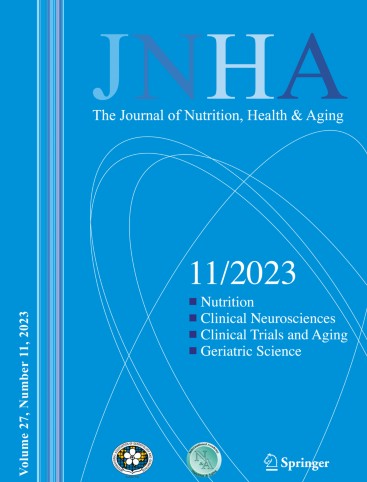Linking social support network deficits to late-life malnutrition: The hidden psychological pathway
IF 4
3区 医学
Q1 GERIATRICS & GERONTOLOGY
引用次数: 0
Abstract
Objectives
Social and mental health significantly influence the nutritional status of older adults. While a relationship exists between social support network deficits and malnutrition, the underlying mechanisms remain unclear. This study aims to explore the associations and potential psychological pathways among social support network deficits, depressive symptoms, and malnutrition in older adults.
Methods
A secondary analysis was conducted using data from the Jockey Club Pathway to Healthy Aging project, collected between May 2022 and June 2024. Structural equation modeling was employed to examine the relationships among social support network deficits, depressive symptoms, and malnutrition, as well as the mediating role of depressive symptoms in the overall participants and across body mass index subgroups.
Results
The study included 5,286 older adults, with an undernourishment prevalence of 14.8%. Social support network deficits (β = −0.044, p = 0.004) and depressive symptoms (β = −0.150, p < 0.001) were significantly negatively associated with malnutrition scores, with depressive symptoms mediating 55.1% of the total effect (β = −0.098, p < 0.001). Depressive symptoms acted as a complete mediator in the normal weight group, while it served as a partial mediator in the overweight and obese groups.
Conclusions
The risk of malnutrition in older adults is associated with social support network deficits and depressive symptoms. Preventive strategies should differ based on body mass index, focusing on social factors for overweight and obese individuals while addressing negative emotions in those with normal weight to encourage healthy dietary habits and lifestyles.
将社会支持网络缺陷与晚年营养不良联系起来:隐藏的心理途径
目的社会和心理健康对老年人营养状况有显著影响。虽然社会支持网络缺陷与营养不良之间存在关系,但其潜在机制尚不清楚。本研究旨在探讨老年人社会支持网络缺陷、抑郁症状和营养不良之间的联系和潜在的心理途径。方法利用赛马会健康老龄化路径项目的数据进行二次分析,收集时间为2022年5月至2024年6月。采用结构方程模型检验社会支持网络缺失、抑郁症状和营养不良之间的关系,以及抑郁症状在整体参与者和跨体重指数亚组中的中介作用。结果该研究包括5286名老年人,营养不良患病率为14.8%。社会支持网络缺陷(β = - 0.044, p = 0.004)和抑郁症状(β = - 0.150, p < 0.001)与营养不良评分呈显著负相关,其中抑郁症状介导了总效应的55.1% (β = - 0.098, p < 0.001)。抑郁症状在正常体重组中起完全中介作用,而在超重和肥胖组中起部分中介作用。结论老年人营养不良风险与社会支持网络缺失和抑郁症状相关。预防策略应根据体重指数的不同而有所不同,重点关注超重和肥胖个体的社会因素,同时解决体重正常人群的负面情绪,鼓励健康的饮食习惯和生活方式。
本文章由计算机程序翻译,如有差异,请以英文原文为准。
求助全文
约1分钟内获得全文
求助全文
来源期刊
CiteScore
7.80
自引率
3.40%
发文量
136
审稿时长
4-8 weeks
期刊介绍:
There is increasing scientific and clinical interest in the interactions of nutrition and health as part of the aging process. This interest is due to the important role that nutrition plays throughout the life span. This role affects the growth and development of the body during childhood, affects the risk of acute and chronic diseases, the maintenance of physiological processes and the biological process of aging. A major aim of "The Journal of Nutrition, Health & Aging" is to contribute to the improvement of knowledge regarding the relationships between nutrition and the aging process from birth to old age.

 求助内容:
求助内容: 应助结果提醒方式:
应助结果提醒方式:


